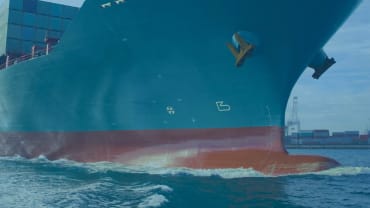Major energy and infrastructure projects, both new and those being decommissioned, typically involve a range of participants domiciled in different jurisdictions. Large energy projects are notoriously complex. It is not uncommon for the energy generation solutions to be innovative, the materials and technologies involved new and the local geography challenging.
Technology earmarked for the project also frequently moves on during the construction phase, necessitating changes to project planning, personnel and cost. In short, there can be unavoidable commercial disputes throughout such projects.
Ken MacDonald and Christopher Duff, dispute resolution partners at Brodies LLP, discuss the increasing use of arbitration and adjudication in cross border disputes and how to effectively resolve such disputes and enforce decisions reached. Comparing sectors, Ken and Chis look at what the energy and the construction sectors can learn from each other.
Don't forget to listen to our podcast about Scotland, cleantech and the energy transition now.
The information in this podcast was correct at the time of recording. The podcast and its content is for general information purposes only and should not be regarded as legal advice. This episode was recorded on 15/02/24.
David Lee, Podcast host
David is an experienced journalist, writer and broadcaster based in Scotland. He has been the host of Podcasts by Brodies since 2021.
![David Lee, Podcast host]](https://res.cloudinary.com/brodies-com/image/fetch/f_auto,q_auto/https://brodies.com/assets/uploads/images/people/guest-speakers/david-lee-podcast.jpg)
Transcript
Transcript
00:00:10 David Lee, Host
Hello and welcome to Podcasts by Brodies. My name is David Lee and in this episode we're discussing the complex issue of resolving international disputes. Major energy and infrastructure projects, both new projects and those being decommissioned, often involve a wide range of participants based in different jurisdictions. Large energy projects are notoriously complex, especially when there's a combination of innovative energy generation solutions, new materials and technologies being deployed and challenging local geography. Technology marked for the project also frequently develops during the construction phase, which can lead to changes to project planning, personnel and cost. In short, this complexity can lead to unavoidable commercial disputes and to discuss this and how different sectors like energy and construction can learn from each other in resolving those disputes, I'm joined by two Brodies experts, Ken MacDonald and Chris Duff, are both dispute resolution partners at Brodies. Welcome to you both.
Ken, first, I mentioned in the introduction there the complexity of the energy sector and how that can lead to commercial disputes. So can you give us a little overview, first of all, of the modern energy sector, the makeup of contracts and how and why disputes might arise?
00:01:39 Ken MacDonald, Partner
The first thing to say is that the energy sector is diverse. It spans differing geographical and legal jurisdictions and there is prolific but not universal use of standard form contracts. There's also plenty of risk, which helps explain why disputes arise. You also have to factor in behaviours by the parties to the contract, which are often tied to a projects finance outturn. Finally some of the sub sectors will often contract with bespoke or amended terms which may not be as industry recognised or well known, and which can promote uncertainty. The mantra is where there is uncertainty, there's scope for dispute.
00:02:27 David Lee, Host
We've already got human behaviour and uncertainty into the mix, so that's a good start. We'll get some definitions clear. When we talk about a dispute in a legal context here, Chris, what do we mean and how commonly do disputes arise?
00:02:46 Christopher Duff, Partner
So usually and this would be true whether the context is energy or as we might come to touch on later in construction, it will be a difference of opinion about what the parties contract requires of them, or perhaps what their entitlements are. To be honest, disputes are relatively commonplace on major projects but whether those disputes end up in a formal process will typically turn on behaviours, it will turn on the strength of the parties relationships, it will turn on their case's strengths and ultimately the value that attaches. You'll tend to find that lots of disputes which emerge in our project can be resolved during the project itself with effective contract or project management. But sometimes the party's position is just too polarised, or the value which attaches to the point is just too great to resolve it without at least starting down the road of a formal process. Very often these days, you do find that contracts start to include tiered or escalation clauses to try and perhaps have a final attempt at resolving that before going into a formal process.
00:04:05 David Lee, Host
Thanks very much, Chris. Coming back to you, Ken, we're talking particularly today about global international disputes, why can those international disputes be particularly complex?
00:04:20 Ken MacDonald, Partner
Well, I think there are both practical and cultural considerations to contend with, which adds to complexity in global disputes. In terms of the practical challenges, it's going to be necessary for the parties to the contract to agree the rules of process, in other words, the rules of engagement as to how they resolve their disputes and that might be very different from how those parties would deal with disputes in their domestic markets, both in terms of choice of law, procedure and so on. Parties also must factor in how they enforce the outcome of the dispute. When a decision is made, how do you enforce that? Or during a dispute, for example, in international arbitration there might be resort to local courts at the seat of the arbitration to enforce certain decisions, You might need to be looking at local law advice in foreign jurisdictions, and you also have to have an understanding of that country's local courts. I think also language or misinterpretation and translation can sometimes be an issue to overcome. Turning to the cultural factors and without adopting lazy tropes, there may be differences in how each party approaches their dispute depending on how they tend to contract and behave in their home jurisdiction.
We often say disputes advice can be a distress purchase and everyone deals with distress differently. If you have language barriers, if you have different values and expectations at play, that can make resolving the dispute somewhat more difficult. That could be particularly important in international arbitration because there may also be differing ethical standards applying to attorneys that would apply in their domestic courts, so the brakes, which are sometimes placed on client and for that matter attorney behaviour are perhaps not as effective in all jurisdictions.
00:06:32 David Lee, Host
Thanks indeed, Ken, clearly explained there. Coming back to you, Chris, if a dispute does arise between different organisations, what are the main factors to consider in the early stages of that dispute or potential dispute?
00:06:49 Christopher Duff, Partner
As the advisor, you are initially keen to establish what your client wants to achieve so effectively, where do they need or want to get to? Thereafter it will be looking at trying to very clearly define what is in dispute, because that will help you identify not just the most suitable process, but also the right decision maker, the right experts, or perhaps witnesses that you might need. Ultimately it will help try and resolve the dispute or at any rate, run the most efficient formal process to have it determined for you. Regarding cross-border disputes, a key issue for us, and Ken has touched on it already, is how do we actually enforce the decision? In a sense, what happens if we win? Usually it's pretty obvious what happens if you lose, but what you don't want to do is win but then run aground trying to enforce that decision in your favour so that's going to be a key issue for us as advisors at the outset. Is there anything you'd add to that, Ken?
00:08:03 Ken MacDonald, Partner
I would also say that we as advisors would always consider whether, even if we're instructed later than ideal, it's still possible to resolve the dispute by agreement because of that by certainty. If negotiation would prove too challenging, then mediation is a good option where an independent third party facilitates discussions to achieve consensual settlement. There is, however patchy application of mediation across the globe, some jurisdictions mandate it, very effectively with cost sanctions, whilst others barely recognise or understand it. There are differences about the mediator's role depending on where you are. So, in some jurisdictions there would be an expectation that the mediator would play a purely facilitating role trying to bring the parties together to reach an agreement, whilst in other jurisdictions parties would look to the mediator for some recommended outcome for their dispute. Further to that, there's also the possibility of what we call Med ARB, and that's where the dispute starts as mediation but morphs into arbitration, and that's where the mediator becomes the arbitrator if no resolution is achieved in the initial mediation stage. I think I'd also say that depending on who we are acting for we'd also want to plan for any possible adverse outcomes, so we obviously worked to win, but it's important to have a Plan B if possible. Many times if we're acting for contractors against employers or service sector companies against operators, that would include a strategy piece which looks at whether our client has rights against subcontractors or third parties.
00:10:00 David Lee, Host
Thanks, Ken, and let's talk more about the construction sector. Chris, can you explain why construction is such a complex area and one where disputes might well occur?
00:10:17 Christopher Duff, Partner
Modern construction is often tasked with delivering major infrastructure, so large projects, but the margins and offer to those delivering those projects are typically thin and so it doesn't actually take too many problems to turn what should be a good project into a really bad project from the contractors perspective. If I'm wearing that contractor hat, then what they would also see is that where there is lay or perhaps changing design, which is a symptom of a project not being properly briefed at the outset, then that is going to cause the genuine to lay an extra expense. From an employer's perspective there has been a definite shift towards allocating both the design and the build risk to the contractor in terms of how we procure our major projects and the quid pro quo is that in doing that they must need some control over the design process to the contractor and if you factor that in alongside the fact that contractors can, on occasion, be a little bit too optimistic on both price and program then there are inevitable tensions that can emerge in connection with quality program and budget. So, you tend to find that in most projects it's really going to come down to focusing on time and money and how you thrash out who's entitled to the time and money. Now that will very often call for a sort of cause and effect style of analysis to demonstrate who's at fault and why but you start having to add in forensic planners, expert surveyors and all of that adds in a real layer of complexity against the claims process and to resolving that dispute.
00:12:22 David Lee, Host
Thanks very much. We’ve touched a little bit on energy and construction, what are the main parallels, Chris, between the two sectors?
00:12:33 Christopher Duff, Partner
Clients in both sectors are tasked with delivering major infrastructure, so they must deal with complex projects, often with new or developing technology, and there is a lot of risk to allocate. So that risk needs to sit somewhere. Both also have multiple parties and stakeholders, so you're going to have owners, contractors, designers, subcontractors, and insurers and most disputes will tend to involve a variety of parties within them. It's very rare for any major dispute on one of these sorts of projects to be a simple dispute between one party and another, it's typically going to involve many. You've also got a real spectrum of organisations in both sectors involved, so you can have large, sophisticated corporates on the one hand but then you're also going to have the local suppliers who's tasked with delivering the materials and the build on the other and that can certainly present challenges.
00:13:38 Ken MacDonald, Partner
I would agree with all of what Chris has just said. In addition, both sectors can be cyclical and different disputes arise in each part of that cycle. In the good times, quality control can suffer as people overtrade by taking on more work than they should and prioritising speed over quality. In the bad times, you will see greater supply chain distress and pressure on margins. I think the resort to arbitration for a final decision as an alternative to use of a national court system in international disputes is another parallel in both sectors. Where I think we will see the parallels converge is around decommissioning. I think in terms of the projects and disputes arising from decommissioning will see a real synergy of practise between the two sectors.
00:14:37 David Lee, Host
Thanks, Ken. We've talked about the similarities. What about the main differences between disputes in energy and construction?
00:14:47 Ken MacDonald, Partner
Well, historically there were higher margins available on energy projects and so in comparative terms, there were fewer disputes than in conventional built environment construction projects. The indemnity regime in certain energy sectors and geographies also reduces certain types of disputes. There remain differences in how projects are procured, how risk is allocated, and how some disputes are resolved. But to the extent these sectors were historically clearly demarcated, and that's becoming less so now, there is a move into renewable energy and whilst traditional energy companies want to own that space, contractors, consultants and suppliers to the construction industry understandably want to participate also and certainly in the UK, that's been the experience to date. I'd be interested in what Chris has to say about risk allocation though in the construction sector in relation to indemnities or insurance arrangements.
00:15:50 Christopher Duff, Partner
It is quite an interesting one because Ken has sort of touched on the indemnity dream and the offshore market, which is effectively a knock for knock insurance arrangement which tends to emerge quite clearly on the major projects and that has not been something which historically construction has necessarily embraced. There's two real points for that, the first is that the losses within the construction sector are significant and are not likely to be of the order of magnitude that you might see in the offshore energy sector, where problems do emerge. Secondly, and for that reason, historically it has been possible within construction to ensure against the risk that you might reasonably expect to cause, and whereas with the same not necessarily being true of the offshore energy sector, they have concentrated on ensuring against the risk they might reasonably expect to suffer. Going forward, you tend to see a move towards project insurance, so major projects might obtain a project specific policy, but it is important that even where you are or believe you are named on that policy you have regard to the underlying contract and place, whether that's between subcontractor and contractor or contractor and employer because ultimately there can be a disconnect between what your underlying contract thinks you're doing in terms of insurance and what policy is purchased on your behalf and where there is that uncertainty. It's a fertile area for dispute.
00:17:34 David Lee, Host
Thanks very much, Chris. You've both set the scene well there. We'll come to some brass tacks now in terms of Brodies advisory role. What steps, Chris, would an organisation need to take in those early stages if a dispute does arise?
00:17:53 Christopher Duff, Partner
They need to know the facts. So, all advisers are likely to be keen on understanding and commanding the facts as early as possible. They also need to be taking the right advice so you know, not just the lawyers, but maybe the experts they're going to need to assist or resolve their claim. All of that is with a view to being in a position to make informed decisions as early as possible. So, you need to understand what a good outcome looks like, and you need to understand that so you can benchmark any offers that you might receive or compromise proposals against what a good and worst case scenario might turn out to be. There are likely to be other steps you're taking in parallel, so externally you're likely to be liaising with at least some of your stakeholders. So you might be liaising with your insurers, customers, but key really is getting that initial command of the facts and making sure you've got a clear understanding of the strategy.
00:18:58 David Lee, Host
We've touched on mediation and arbitration. Let's talk about the different ways that disputes can be resolved in a bit more detail. Ken, why are we seeing a rise in arbitration and adjudication use in cross-border disputes?
00:19:20 Ken MacDonald, Partner
Firstly as regards arbitration, it's always been popular because of its enforceability and how readily easy it is compared to litigation to enforce decisions across the globe. I think depending on where projects are being undertaken there can be distrust of national courts, which again points towards arbitration as a neutral and level playing field. Obviously, in the construction sector, adjudication is prolific, it is very time efficient and there are obviously attractions to that for those seeking to get early effective resolution and indeed payment in respect of their disputes. Arbitration and adjudication will continue to remain popular and I think one of the interesting areas in which both the attributes of those dispute resolution mechanisms come under the spotlight is to what extent they might converge. I think when we talk about dispute resolution mechanisms we're interested in three features. Time, cost and quality, and I think there's certainly been a renewed focus on how we can expedite arbitrate and indeed, how can we elongate adjudications in a way that perhaps we evolve a solution that comes closer between the two?
00:21:00 David Lee, Host
Ken, a key question, how are the outcomes from both arbitration and adjudication enforced after the disputes resolved?
00:21:10 Ken MacDonald, Partner
Courts recognise and enforce decisions of domestic arbitrations and adjudications and do so very effectively, and many jurisdictions have national courts which are very positive in their support of decisions made at arbitration and in adjudication and will not readily interfere with those decisions. For cross-border disputes provided the country where you seek to enforce your award as secretary to the New York Convention, you can enforce the arbitral award and the New York Convention is a very effective international treaty signed by over 140 states that provide a secure platform for the recognition and enforcement of arbitration awards. Adjudication does not yet have an equivalent for this, but for UK projects, even with international organisations or jurisdiction clauses, UK courts are likely to enforce adjudicators decisions.
00:22:21 David Lee, Host
Thanks, Ken. Chris, are there any situations where arbitration and adjudication don't work? Then what happens?
00:22:30 Christopher Duff, Partner
Well, I'm sure the losing party will often feel like they haven't worked for them, but that's the nature and the cost of doing business at times. If you look at arbitration to begin then usually subject to any.
Agreement on whether or not you can take a legal error appeal that is going to be a final and binding decision, and so if you're unhappy with that outcome, then usually it's tough.
Now adjudication is different. I've touched on this, that it it's interim binding. So if you don't like the outcome, if it doesn't work for you as a process, then you can escalate it to a final determination using either litigation or or arbitrary.
Relation and I guess that the overarching point is that whilst we are discussing formal processes, parties are at all times able.
To make use of you know less formal processes like mediation. So if they are genuinely concerned at the outset of the dispute that you know a formal process is not the right one for them, then they should be exploring seriously whether or not they can take matters into perhaps a mediation or something like that.
00:23:43 David Lee, Host
OK. Thanks, Chris. And just sort of moving to summarise now, where do you think the energy and construction sectors can learn from each other in terms of international dispute resolution?
00:23:58 Christopher Duff, Partner
Well, I think there's already been a cross population of ideas between the sectors. You know, you can.
Clearly see that both have in large part embraced private methods of dispute resolution. Whether that's you know arbitration or adjudication. And we are seeing.
Very commonly now tiered escalation clauses which to my mind largely started in the energy sector, but which we are now embracing far more in the construction sector also.
And I think going the other way, we'll start to see more adjudication, which started in construction, but which is now being embraced by by at least some of the energy sector. So you know, renewable energy projects do often have adjudication clause as clauses. And two of the standard decommissioning contracts have a declaration clauses within them.
So certainly we are starting to see far more cross population between the sectors.
00:24:54 Ken MacDonald, Partner
I certainly endorse all of what Chris has said there, and I certainly think that the energy sector has made good use of escalation clauses as a way of effectively determining disputes before the dispute escalates to two formal a process.
I think also the energy sector has made good use of disputes boards and I think both escalation clauses and dispute boards are becoming more commonplace than construction. So effectively you have a tier escalation process. There is, of course, a slight tension between tier escalation and the right to adjudicate at any time.
Which is the statutory position, but escalation provisions still have a place and serve a purpose, and they certainly provide further options and flexibility for parties.
00:25:44 David Lee, Host
Thank you, Ken. Just finally to wrap up, what would you say are those key attributes that all parties need to demonstrate if we are going to resolve an international dispute successfully?
00:25:58 Ken MacDonald, Partner
Thanks, David. For me the key attributes are focus, dispassionate analysis and also realistic expectations of what a successful outcome will look like. You should always be able to place yourself in your opponents shoes, what is motivating them? Where do they want to get to? If you can't or don't want to understand that, it will be difficult to identify common ground.
00:26:26 David Lee, Host
Thanks very much Ken MacDonald and to Chris for your excellent insights today. You've been listening to Podcasts by Brodies, where some of the country's leading lawyers and special guests share their Enlightened Thinking about major issues and developments in the legal sector, and what that means for organisations, businesses and individuals across the various sectors of the economy and wider society. If you'd like to hear more, please subscribe to Podcasts by Brodies on all your favourite podcast platforms and for more information and insights, please visit www.brodies.com.
Contributors
Partner
Partner













